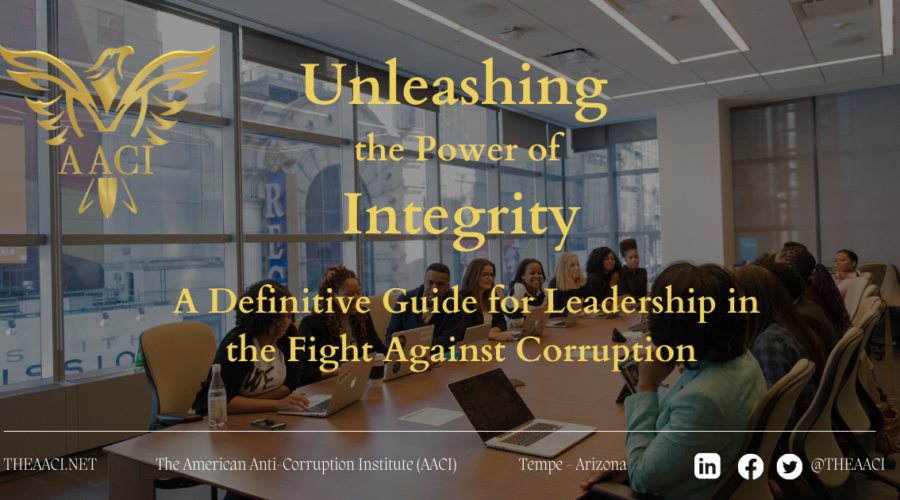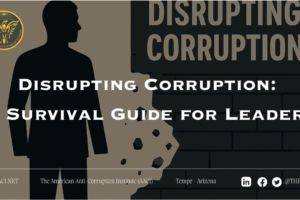Mike J. Masoud
September 13, 2023
Introduction
In the complex landscape of today’s global organizations, the specters of corruption, fraud, and money laundering loom ominously. As leaders occupying executive management, board seats, or senior official positions, the mantle of responsibility falls squarely upon their shoulders. Those charged with governance are the guardians tasked with deterring, preventing, and ferreting out these insidious threats to our stakeholders. This post serves as a clarion call, rallying leaders worldwide to recognize corruption’s perils and proactively cultivate a culture of unwavering integrity.
Understanding the Devastation of Corruption
Corruption is a multifaceted demon, manifesting in various guises, such as bribery, embezzlement, and the abuse of power. Regardless of its form, its consequences are universally destructive. Corruption’s insidious tendrils reach far and wide, leaving a trail of reputational and legal wreckage. Beyond that, corruption distorts the fabric of resource allocation, tarnishes the quality of goods and services, inflates costs, and erodes the pillars of our institutions.
Consider, for instance, bribery’s corrosive influence, which often births sub-standard infrastructure projects laden with bloated budgets and hazardous outcomes. On the other hand, financial statement fraud erodes investor confidence and saps the morale of dedicated employees. Corruption is the nefarious saboteur of organizational performance and stakeholder trust.
Recognizing the Precursors of Corruption
Like a sinister siren, corruption lures even the most virtuous individuals into treacherous waters. It thrives in environments marked by specific pressures and opportunities:
- Pressure to Meet Unrealistic Performance Targets: The relentless drive to achieve unattainable objectives can lead well-intentioned individuals astray.
- Financial Difficulties or Extravagant Lifestyles: Personal financial struggles or desires for a lifestyle beyond one’s means can sow the seeds of unethical behavior.
- Cultural Norms that Justify ‘Cutting Corners’: Corruption can fester in societies where bending the rules is normalized.
- Opportunities Abound: Corruption flourishes when authority goes unchecked, and cozy relationships with suppliers or clients create fertile ground for misconduct.
- Improper Segregation of Duties: Weaknesses in internal controls can open the door to corruption.
Vigilance and Prevention
To combat corruption, an unwavering commitment to vigilance is paramount. Regularly scrutinizing operations for corruption red flags is non-negotiable. Moreover, establishing robust internal control mechanisms, implementing comprehensive corruption prevention policies, and nurturing a culture that encourages whistleblowing are foundational steps.
An Emphasis on Financial Intelligence
Leaders must equip themselves with financial intelligence, mastering the nuances of audited financial statements and the independent auditor’s report. This expertise empowers you to pose intelligent questions that are a powerful deterrent to corruption while providing an accurate gauge of performance and risks. Through this lens, we become discerning, hands-on leaders equipped to navigate the complex financial terrain.
Building an Ethical Citadel
Creating a culture of integrity is an endeavor that necessitates concerted effort:
- Lead by Example: Demonstrate zero tolerance for misconduct, setting the gold standard for ethical behavior.
- Institute Robust Internal Control: Implement rigorous internal control, internal audit procedures, and compliance mechanisms.
- Transparency is Key: Enhance transparency in all operational facets, making decisions under the unforgiving glare of scrutiny.
- Invest in Anti-Corruption Knowledge: Provide anti-corruption training and certification for all personnel, ensuring everyone is equipped with the tools to fight corruption.
- Open Communication: Encourage open dialogue and support transparent communication channels that allow concerns to be voiced without fear.
- Resist Temptation: Uphold a steadfast stance against conflicts of interest and underpin this with compelling conflicts of interest policy.
In Conclusion
You are the vanguard of change, empowered by knowledge and duty-bound by your roles. The battle against corruption is not optional; it is your legal, moral, and patriotic obligation to your organizations and the communities we serve. Collaborate with your fellow leaders and colleagues to fortify governance, seal loopholes, and exalt ethical conduct. The future of our organizations and our world hinges on our unwavering commitment to the cause. Rise to the occasion, for integrity is our guiding light in the fight against corruption.
Photo by Christina Morillo: https://www.pexels.com/photo/group-of-people-on-a-conference-room-1181406/










































